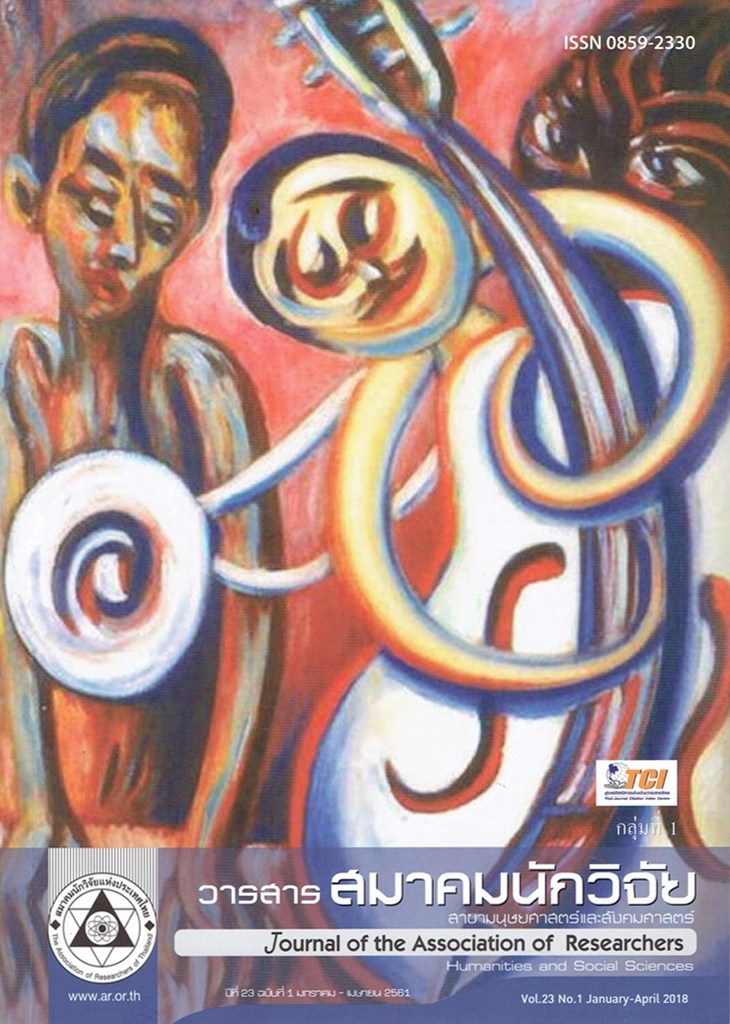Policy Evaluation of Copyright Act 2537 (1994) For the Copyright Infringement in Cinematographic Works
Main Article Content
Abstract
This purposes of this research is to study the process and evaluation of the Copyright Act B.E. 2537 (1994) policy in cinematographic works and to find approaches to improve effectiveness of the policy. The research is a qualitative study using the following research tools: the researcher and structured in-depth interview questions. Both participant and non-participant observation occurred. 38 people were treated as crucial research information sources and were distinguished into 2 groups. The first group were from 3 different sectors relevant to the infringement of cinematographic works: 1) Economic Crime Suppression Division, 2) Department of Intellectual Property and 3) Department of Intellectual Property and International Trade Litigation. Another group of crucial research information sources were separated into 4 sub-groups: copyright owner, those who violate the Copyright Act, officials enforcing laws on copyright infringement and the cinema management person in charge. The research found that technology devices used to commit economic crime change rapidly, causing the difficulties in the prevention and suppression. The existed policy was found inadequate and ineffective. Ongoing increases in copyright infringement of cinematographic works were found even after the Copyright Act has been enforced and currently there are no precise approaches of study to find solutions for the following issues. Despite having consequences used on copyright infringement namely arrests, legal charges or compromises of claims, the number of those violating the Copyright Act rises. This can be said that due to the negligence by the government leaders to prioritize issues of copyright infringement, in particular the macro communication and command, and micro level of charges occurred only as consequences for copyright infringement. There are no public campaigns or relations to influence the nation to abstain copyright infringement activities. Important aspects found on building knowledge on the issue of copyright infringement are the theory of Jurisprudence and the theory of Public Administration, which are not conform to the changes of technology. Suggestion from this study is, in terms of the macro scale, government leaders should provide public relations to curb copyright infringement by encouraging the people to acquire a culture and value on preventing copyright infringement activities. The government are responsible in regulating appropriate rate of penalty for the committed crime in order to solve issues on unlawful claim of right by copyright owner to enforce penalty. The economic law including the copyright should also be reviewed regularly, as well as organizing training seminars to provide knowledge on the copyright law for government officials in sectors which enforces the Copyright Act. In terms of the micro scale, organizations should implement campaigns to promote the nation to be aware of consequences and penalty resulting from infringement of copyright and to improve the effectiveness of the process for these types of campaign.
Article Details
บทความที่ปรากฏในวารสารนี้ เป็นความรับผิดชอบของผู้เขียน ซึ่งสมาคมนักวิจัยไม่จำเป็นต้องเห็นด้วยเสมอไป การนำเสนอผลงานวิจัยและบทความในวารสารนี้ไปเผยแพร่สามารถกระทำได้ โดยระบุแหล่งอ้างอิงจาก "วารสารสมาคมนักวิจัย"
References
__________ (2555). ความรพู้นื้ฐานเกยี่วกบักฎหมาย. พมิพค์รงั้ท ี่11. กรงุเทพฯ : สำนกัพมิพแ์หง่จฬุาลงกรณม์หาวทิยาลยั.
ประสบสุข บุญเดช. (2553). ประมวลกฎหมายแพ่งและพาณิชย์ (ปรับปรุงพิเศษ). กรุงเทพฯ: มหาวิทยาลัยรามคำแหง.
วรเดช จันทรศร. (2556). ทฤษฎีการนำนโยบายสาธารณะไปปฏิบัติ. พิมพ์ครั้งที่ 6. กรุงเทพฯ : หจก.สหายบล็อกและการ พิมพ์จำกัด.
วรเดช จันทรศร และไพโรจน์ ภัทรนรากุล. (2543). การพัฒนาระบบมาตรฐานสากลของประเทศไทยด้านการจัดการและ สัมฤทธิ์ผลของงานภาครัฐ (พิมพ์ครั้งที่ 2). กรุงเทพฯ: สหายบล็อกและการพิมพ์.
ศิริชัย กาญจนวาสี. (2550). ทฤษฎีการประเมิน. กรุงเทพฯ: สำนักพิมพ์จุฬาลงกรณ์หาวิทยาลัย. ศุภชัย ยาวะประภาษ. (2552). นโยบายสาธารณะ. กรุงเทพฯ: สำนักพิมพ์จุฬาลงกรณ์มหาวิทยาลัย. พระราชบัญญัติลิขสิทธิ์ พ.ศ. 2537. กระทรวงพาณิชย์, กรมทรัพย์สินทางปัญญา.
References
Bardach, Eugene. (1980). Implementation Studies and the study of Implements. American Policy Science Association. 32(2), 92-107.
Boondej Prasopsuk. (2010). Civil And Commercial Code (special revised edition). Bangkok: Ramkhamhaeng University. (in thai).
Chandarasorn Voradej. (2013). Theory of Public Policy Implementation (6th edition). Bangkok: Sahyblock and karnpim limited partnership. (in thai).
Chandarasorn Voradej and Pataranarakul Pairoj. (2000). Development of international standard systems in Thailand: The management and achievement of the government. Bangkok: Sahyblock and karnpim limited partnership. (in thai).
Charles, Jones O. (1977). Public Policy Analysis: An Introduction. Englewood Cliffs: Prentice.
Chumpa Manit. (2011). Description of the law on Computer-related Crime (2nd edition). Bangkok: SE-ED. (in thai).
Copyright Act 2537 (1994). Ministry of Commerce, Department of Intellectual Property. (in thai).
Denzin, N.K. (1978). The research act: A theoretical introduction to sociological methods. New York: McGraw-Hill.
Edwards, G. C. (1980). Implementing public policy. Washington, DC: Congressional Quarterly Press.
James E., A. (2003). Public Policy Making. New York: Houghton Mifflin.
Kanjanavasri Sirichai. (2007). Theory of Evaluation. Bangkok: Chulalongkorn University Printing House. (in thai).
Patton, Michael Q. (1990). Qualitative Evaluation and Research Methods (2nd ed). CA: Sage. Pressman, Jeffrey L. and Wildavsky, Aaron. (1979). Implementation (2nd ed.). Berkeley, California : University of California Press.
Rossi, F. (1982). Evaluation A Systematic Approach. 7rd ed. New York: Sage Publication, Inc.
Sabatier,Pual A and. A. Mazmanian. (1989). Policy implementation. New York: Marcell Dekker, Inc.
Van, H., Carl, E. and Van, M., Donald S. (1975). The Implementation of Intergovernmental Policy. California: Sage. Yavaprabhas Supachai. (2009). Public Policy. Bangkok: Chulalongkorn University Printing House. (in thai).


